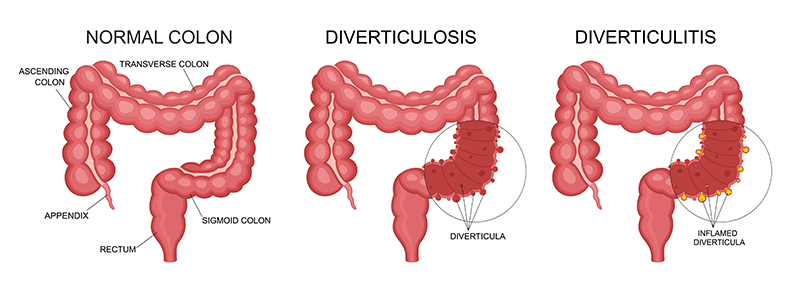Our pediatric gastroenterologists (specialists in digestive disorders) offer the latest treatments for children who have diverticulitis. Doctors across North Texas send their patients to us because of our expertise in recognizing, diagnosing and treating rare digestive disorders in children. We are experts at helping children achieve lasting digestive health, no matter how uncommon their condition may be.
Overview
What is pediatric diverticulitis?
Diverticulitis happens when small pouches (called diverticula) in the digestive tract become infected or inflamed. Usually, these swollen diverticula occur in the wall of the colon (large intestine), but they can form elsewhere in the digestive tract, too. Sometimes, these pouches can develop without becoming infected or inflamed. This is called diverticulosis
Some children can develop diverticulosis, but diverticulitis is very rare in children. Diverticula develop more often in people over age 50 and usually don’t cause problems unless they become inflamed.
However, if your child is showing signs of having diverticulitis, it’s important to have them see an experienced gastroenterologist, like those at Children's Health℠. Our team has the expertise to confirm an accurate diagnosis and provide the proper treatment for your child.

Signs and Symptoms
What are the signs and symptoms of pediatric diverticulitis?
Symptoms of diverticulitis include:
Fever
Blood in stools
Diagnosis
How is pediatric diverticulitis diagnosed?
At Children’s Health, our pediatric gastroenterologists begin your child’s evaluation with a physical exam. We also ask you about your child’s personal and family medical history.
We usually need to run tests to confirm a diverticulitis diagnosis. Depending on your child’s symptoms, they may need one or more tests, such as:
Barium enema. This test involves injecting a contrast medium, called barium, into the rectum (end of the colon) to make the large intestine more visible on imaging, such as X-rays.
Colonoscopy. In this procedure, our doctors insert a scope (thin, flexible tube with a small camera) into the colon to view inside the large intestine
Imaging. We take images of the inside of your child’s lower abdomen to look for signs of diverticulitis. Some types of imaging we use to diagnose pediatric diverticulitis include X-rays, computed tomography (CT) scans and magnetic resonance imaging (MRI).
Causes
What causes pediatric diverticulitis?
Diverticulitis can be hereditary (meaning, passed down in families) but not contagious. Doctors don’t yet know exactly why diverticula become inflamed in some children.
However, certain factors can increase your child’s risk of diverticulosis:
Diet that is high in animal fat and low in fiber
Lack of physical activity
Certain health conditions, like Williams syndrome
Treatment
Diverticulitis complications in children
Infection that occurs with diverticulitis in children can sometimes lead to complications, which may include:
Blockage. An infection can cause scarring in the intestine, which narrows or blocks contents from passing through.
Fistula. An abnormal passageway can form between sections of the intestine or between the intestine and other organs, such as the bladder or vagina.
Peritonitis. An abdominal infection can occur if the infected or inflamed pouch ruptures, spilling intestinal contents into the abdominal cavity. Peritonitis is a medical emergency and requires immediate care.
Doctors and Providers
While diverticulitis is extremely rare in children, our expert team is well-equipped to treat the condition if your child develops it. We can also help with diverticulosis.
 Bradley Alan BarthPediatric Gastroenterologist
Bradley Alan BarthPediatric Gastroenterologist Christopher Douglas JolleyPediatric Gastroenterologist
Christopher Douglas JolleyPediatric Gastroenterologist Michele Jacqueline AlkalayPediatric Gastroenterologist
Michele Jacqueline AlkalayPediatric Gastroenterologist Jane AlookaranPediatric Gastroenterologist
Jane AlookaranPediatric Gastroenterologist Johanna Ascher BartlettPediatric Gastroenterologist
Johanna Ascher BartlettPediatric Gastroenterologist Sarah Endicott BarlowPediatric Gastroenterologist
Sarah Endicott BarlowPediatric Gastroenterologist Nandini ChannabasappaPediatric Gastroenterologist
Nandini ChannabasappaPediatric Gastroenterologist Nonyelum Erica EbigboPediatric Gastroenterologist
Nonyelum Erica EbigboPediatric Gastroenterologist Aakash GoyalPediatric Gastroenterologist
Aakash GoyalPediatric Gastroenterologist Bhaskar GurramPediatric Gastroenterologist
Bhaskar GurramPediatric Gastroenterologist Boram JiPediatric Gastroenterologist
Boram JiPediatric Gastroenterologist Lauren Kylie LazarPediatric Gastroenterologist
Lauren Kylie LazarPediatric Gastroenterologist Megha Satish MehtaPediatric Gastroenterologist
Megha Satish MehtaPediatric Gastroenterologist Derek Ming Hei NgaiPediatric Gastroenterologist
Derek Ming Hei NgaiPediatric Gastroenterologist Claudia PhenPediatric Gastroenterologist
Claudia PhenPediatric Gastroenterologist Charina Marie RamirezPediatric Gastroenterologist
Charina Marie RamirezPediatric Gastroenterologist Isabel Cristina Rojas SantamariaPediatric Gastroenterologist
Isabel Cristina Rojas SantamariaPediatric Gastroenterologist Adam Michael RussmanPediatric Gastroenterologist
Adam Michael RussmanPediatric Gastroenterologist Rinarani Monish SanghaviPediatric Gastroenterologist
Rinarani Monish SanghaviPediatric Gastroenterologist Jacobo Leopoldo SantolayaPediatric Gastroenterologist
Jacobo Leopoldo SantolayaPediatric Gastroenterologist Mhammad Gaith Said SemrinPediatric Gastroenterologist
Mhammad Gaith Said SemrinPediatric Gastroenterologist Luis Fernando Sifuentes DominguezPediatric Gastroenterologist
Luis Fernando Sifuentes DominguezPediatric Gastroenterologist Jeremy Wayne StewartPediatric Gastroenterologist
Jeremy Wayne StewartPediatric Gastroenterologist David Michael TroendlePediatric Gastroenterologist
David Michael TroendlePediatric Gastroenterologist Srisindu VellankiPediatric Gastroenterologist
Srisindu VellankiPediatric Gastroenterologist Wenjing ZongPediatric Gastroenterologist
Wenjing ZongPediatric Gastroenterologist Stevie Puckett PerezPediatric Psychologist - Gastroenterology (GI)
Stevie Puckett PerezPediatric Psychologist - Gastroenterology (GI) Meghana Nitin SathePediatric Gastroenterologist
Meghana Nitin SathePediatric Gastroenterologist Jessina ThomasPediatric Gastroenterologist
Jessina ThomasPediatric Gastroenterologist